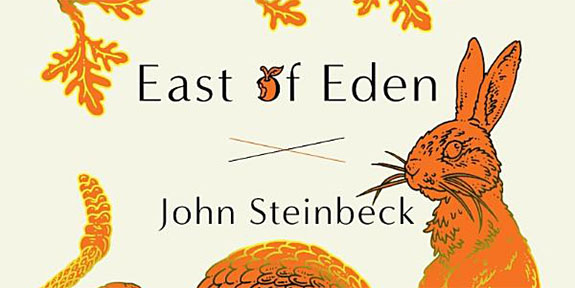I can’t remember how East of Eden ended up on my reading list. Maybe it was on a “Top Ten Books You Must Read Before You Die” list or some such, but here I am trying to tackle the classic. I find reading the classics, at times, difficult. Same with nonfiction. The use of the English language can be difficult to understand in the former, and both can lack a sufficient amount of action, intrigue, or drama to keep my engaged. I’ve completed nearly 100 pages of East of Eden so far, and I feel this will be one of the classics I finish.
It didn’t take long before I was reading and rereading passages that struck a nerve and prompted me to write them down to look at later.
From Chapter 1:
You can boast about anything if it’s all you have. Maybe the less you have, the more you are required to boast.
There are certainly those whom these sentences describe perfectly. I know I have met people who fit the bill. I do feel that this sentiment can apply to both the physical and non-physical. If you don’t have much in the way of wealth, once you have something of value you can’t help but make sure everyone knows about it. Perhaps you’re sharing good news or good fortune, or, deep down, you’re trying to illicit jealousy in those you’re sharing with.
Can’t you accomplish the same with the non-physical? For example, you may have nothing in the way of physical wealth to boast about, but boast about how smart your kids are. Or perhaps how much you and your wife love one another. Humans are great at singing our own praises.
From Chapter 3:
When a child first catches adults out – when it first walks into his grave little head that adults do not have divine intelligence, that their judgments are not always wise, their thinking true, their sentences just – his world falls into panic desolation. The gods are fallen and all safety gone.
My parents divorced when I was eight years old and it sent my world into a tailspin. We left a newly built home. We moved from the only area I could remember enough of to call home. The three of us, my mom, sister, and I, were setting out and starting an entirely new life albeit one without my father.
My mother tried her best to minimize the effects on my sister and I; however, there is only so much a single mother could do in the mid-80s. The situation made further dire by a father who’d effectively moved on and decided his new wife and fledgling family were to be the new center of his life. A father and second family whom I only visited one summer. And a single summer was all it took to damage our relationship beyond all repair. After that visit, I vowed to never see him, or allow to be seen by him for the rest of our lives. A vow I kept until his passing in the spring of 2000.
From Chapter 5:
Certain individuals, not by any means always deserving, are truly beloved of the gods. Things come to then without their effort or planning.
This feels so true especially in the context of the book. After this excerpt, Steinbeck goes on to talk about how Will Hamilton was exceptionally lucky and had a knack for being at the right place at the right time. Some people just have all the luck!

Be First to Comment